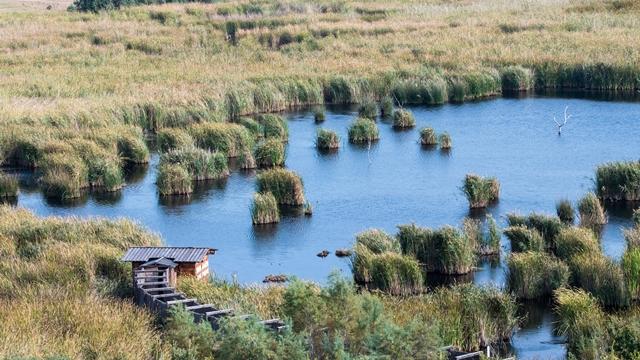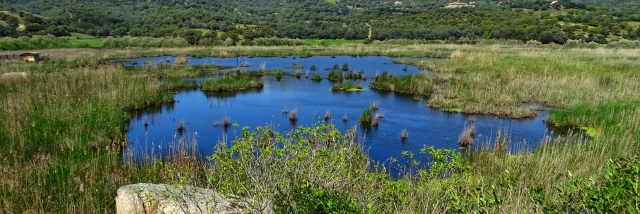 Dl Hd Ld Tanchiccia Jpeg Copie
Dl Hd Ld Tanchiccia Jpeg CopieThe 28-hectare Etang de Tanchiccia is owned by the Collectivité de Corse. Located in the commune of Serra di Ferro, it is part of an 80-hectare “Espace Naturel Sensible” (sensitive natural area), inventoried as a type 1 ZNIEFF (natural area of ecological, faunistic and floristic interest) and included in the Natura 2000 network, as well as in the “espaces remarquables du littoral” (remarkable coastal areas). Fed solely by the autumn and winter flooding of the Taravo, the Tanchiccia pond is at its fullest at the start of winter. It then gradually empties in spring, to be almost completely dry by the end of summer. What’s more, the Tanchiccia reedbed is the largest reedbed in southern Corsica! Punctuated by water collections, ponds and old drainage channels, it is a calm and attractive place for a wide variety of animal species, especially birds.
- Opening hours
Opening times:
- From January 1 to March 31: 8:00 am to 4:00 pm weekends & public holidays included
- From April 1 to May 31: 12:00 to 19:00 weekends and public holidays included – (site closed Monday and Tuesday)
- June 1 to June 30: 6:30 to 19:00 weekends and public holidays included
- July 1 to September 30: mornings from 6:30 a.m. to 1:30 p.m. and afternoons from 4:00 p.m. to 8:00 p.m. weekends and public holidays included
Free admission
Binoculars and spotting scopes available on loan against deposit and ID
Parking on site
- Contact
Address: RD757 – Serra-Di-Ferro (20140)
📞 : 04 95 29 17 57
📧 : tanchiccia@corsedusud.fr
Nearly 400 species of flora (i.e. around 8% of France’s flora!) have been inventoried, many of them with culinary or medicinal properties. Large populations of lizards and turtles, dragonflies and multicolored butterflies, as well as grasshoppers and locusts, inhabit the reedbeds and pondside scrub. No fewer than 148 bird species have been counted here to date, including the 9 European herons. ¾ of these species are protected and more than half breed on the site.


